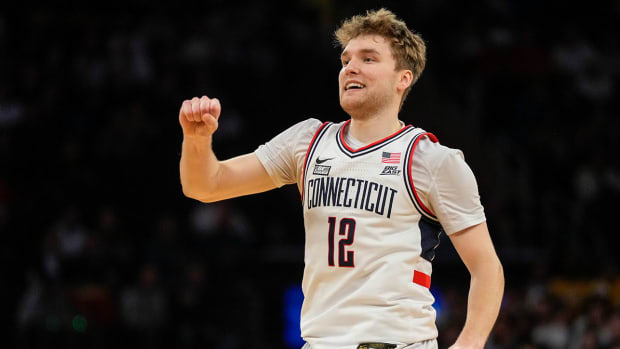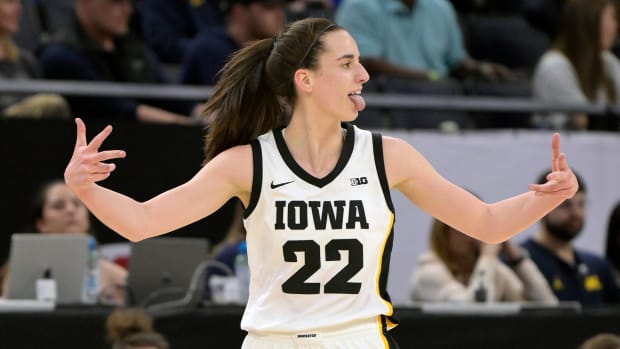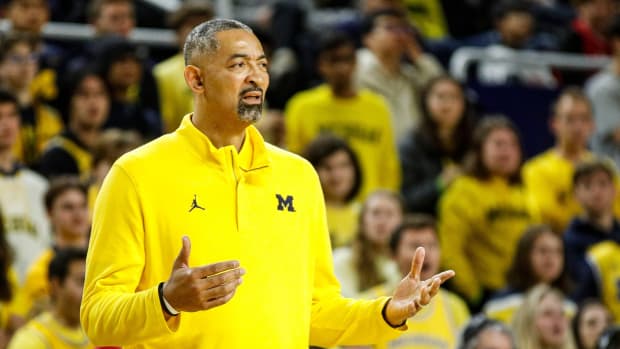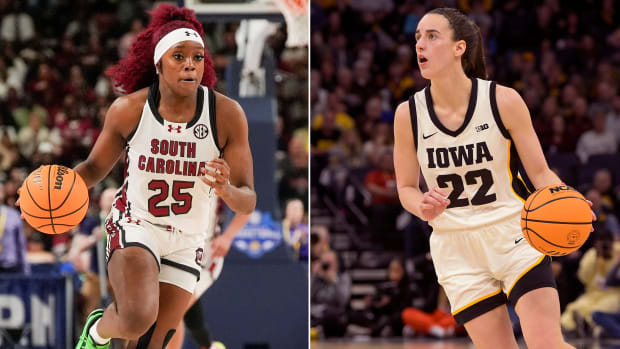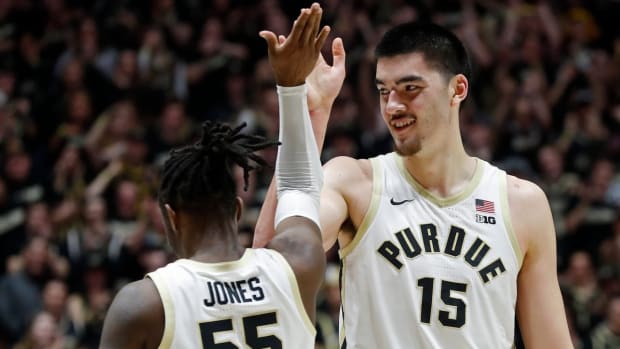This story is part of Sports Illustrated’s exploration of the ways sports and finance intertwine—from the NIL revolution to online betting, business-minded athletes and more. For more on sports and money, see SI’s October 2023 Money Issue.
Viewers saw what they wanted to see in this year’s NCAA women’s basketball title game. Fans saw a coronation for women’s sports: 9.9 million people, the tournament’s biggest audience ever and a 104% increase over 2022, watched LSU defeat Iowa.
Pundits saw controversy: In the waning minutes of the game, Tigers star Angel Reese waved her hand over her face, which Hawkeyes star Caitlin Clark had done earlier in the tournament to another player, then pointed to her ring finger, where her championship jewelry would soon reside. She and Clark later became protagonists in a discussion of race—Reese is Black, Clark is white—and competitiveness in women’s sports.
Reese saw a marketing opportunity. There was still red confetti in her hair when she perched at the edge of the court, clutching the trophy, and called to teammate Flau’jae Johnson’s mother, Kia Brooks, who handles Johnson’s endorsement deals: “Hey, Mama Kia! The price just went up!”
In the two years since the NCAA, spurred by a variety of new state laws, allowed collegiate athletes to profit off their name, image and likeness, athletes have made nearly $2 billion, according to NIL platform Opendorse. Most of that cash has gone to football and men’s basketball players, especially through booster- and fan-led collectives.
Except at LSU, where all the biggest stars are women.
On3, which tracks NIL deals, ranks LSU gymnast Olivia Dunne as the No. 3 earner in the country—after only Bronny James and Shedeur Sanders, sons of star athletes LeBron and Deion—with an estimated valuation of $3.2 million; Reese eighth, with $1.7 million; and Johnson 19th, at $1.1 million. Those numbers are likely low; Johnson estimates her agreements run into “the mid-seven figures.” Regardless, they make LSU one of two schools, along with Texas, with three athletes in the top 25. With Hailey Van Lith—who announced in April that she was transferring to LSU from Louisville to play basketball and who ranks 79th at $550,000—the Tigers have four of the six female athletes in the On3 top 100.
Reese and Johnson say they did not discuss NIL much with Van Lith, who declined to be interviewed on the subject—as a rising senior, “she already knew what she had going on,” Reese says—but they make one point over and over again to high school recruits.
As Johnson says, “You wanna be a superstar, come to LSU.”

Johnson (left) and Reese (right) were key players in LSU's 2022–23 championship season.
Kirby Lee/USA TODAY Sports
As a high school senior, Reese could never have imagined hearing, let alone saying, that sentence. She did not think about marketing herself—the NIL era was still a year away—but she did think about playing in the Final Four, and for that reason she did not think about playing in Baton Rouge.
“I didn’t consider LSU at all,” says Reese, a Baltimore native who signed with Maryland.
A successful year for the Tigers in those days meant going .500 in conference play. But when coach Nikki Fargas resigned after the 2021 season to become president of the WNBA’s Las Vegas Aces, LSU athletic director Scott Woodward called the legendary Kim Mulkey, a native of nearby Tickfaw, who had won three national championships in her 21 seasons at Baylor. Four years earlier the Bears had brought in new administration, and Mulkey did not feel the level of support she had once enjoyed. So she became the first football or basketball coach with multiple national championships over a span of more than a decade to leave their school for another college job. “I grew up here,” Mulkey told Sports Illustrated at the time. “I want people to see me do good things here and think, You know what? I can stay home in Louisiana and do good things here, too.”
It would be hard to complain about the level of support she has received since arriving. In her first year, she led a $1 million renovation of the women’s basketball offices as the team went 26–6; in her second, she won the title; in her third, she will lead a $1.5 million renovation of the women’s locker room and lounges at the basketball arena.
It was that kind of commitment that drew Reese to LSU. The forward had played two seasons at Maryland, averaging 17.8 points and 10.6 rebounds per game as a sophomore, by which point, she says, “I wanted more.” She knew that Mulkey would push her to fulfill her basketball potential. And after she visited campus in the spring of 2022 and met with representatives from NILSU, the university’s department devoted entirely to helping athletes cash in, she realized a move to Baton Rouge would help her fulfill her earnings potential, too.
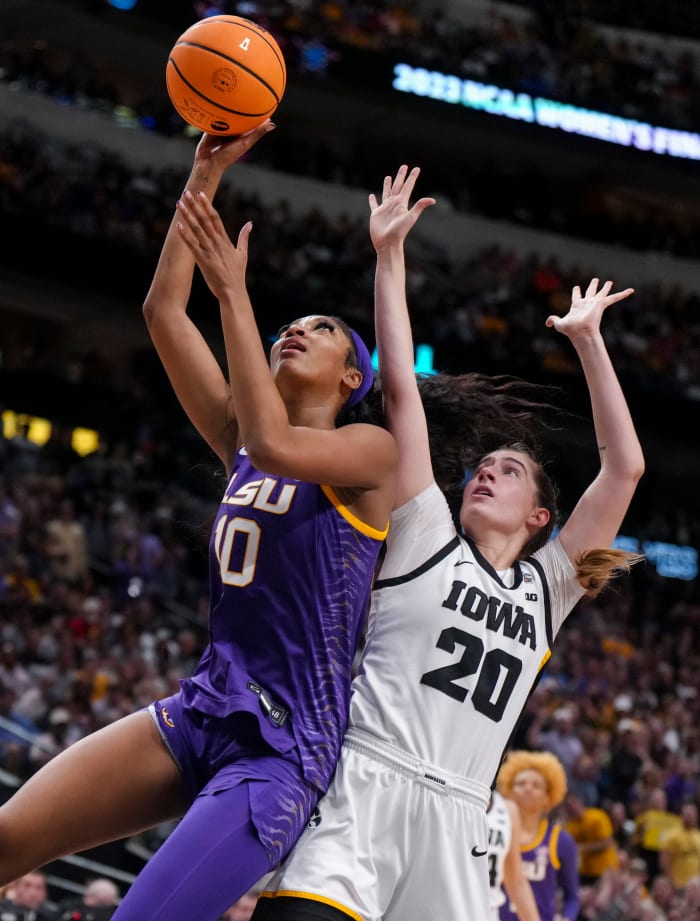
Reese, now nicknamed the Bayou Barbie, originally played for Maryland before transferring to LSU.
Kirby Lee/USA TODAY Sports
Even at LSU, most money from the school’s official collective, Bayou Traditions, goes to male athletes. “I would say 90 to 95% of what Bayou Traditions has raised has gone to male athletic programs,” says Mackenzie Landry, who, through the company MatchPoint, runs operations for the collective. And women college athletes in particular face a disproportionate challenge: Even if they play professionally, their NIL will probably never be more valuable than it is now.
Johnson, who started at shooting guard last year as a freshman, hopes to play in the WNBA but is also focusing on a career as a rapper; the record deal she signed with Roc Nation would have cost her her athletic eligibility before NIL. In addition to monetizing their social media followings, Dunne (who has 7.8 million followers on TikTok and 4.4 million on Instagram) and Reese (2.5 million and 2.5 million) are both building second careers as models, including in the 2023 Sports Illustrated Swimsuit Issue, for which they were paid a standard editorial day rate.
“Everybody knows the WNBA doesn’t make that much money, so I just want to be able to grow my brand as much as I can in college before I go to the WNBA,” says Reese, who would be able to earn a salary no more than $75,000 next year under the WNBA’s rookie pay scale. “I’ve done so many photo shoots. I’ve done so many commercials. Being able to pitch those things with the team I have now is going to help me when I graduate and decide to go to the WNBA.”
In the meantime, they try to use their popularity to help other female athletes. “Even the girls who walk on, they’re getting money,” says Reese. “Everybody’s benefiting from it, not just the stars of the team.” And Dunne recently announced the creation of the Livvy Fund, a program within the school’s collective to connect other LSU women athletes with brands. Many of her sponsors have contributed, she says, and anyone who donates more than a certain amount also has the option of including Dunne in promotional campaigns.
“There’s definitely an underlying problem, which is that the money needs to go to support women’s sports, because there’s not many [lucrative] professional leagues for women’s sports after college,” Dunne says. “So it’s really important that women can capitalize on it now while they’re in college.”
This is all moving very quickly, and different elements of it catch different people off guard. When LSU hired extra security for the gymnastics team, Taylor Jacobs, the associate athletic director in charge of NIL, overheard someone express surprise that Dunne—who has represented the U.S. on the junior level but has never competed in the all-around for LSU—has become such a celebrity. Not everyone understands, Jacobs explains, “that if you have four million followers on social media, you are in fact famous.”
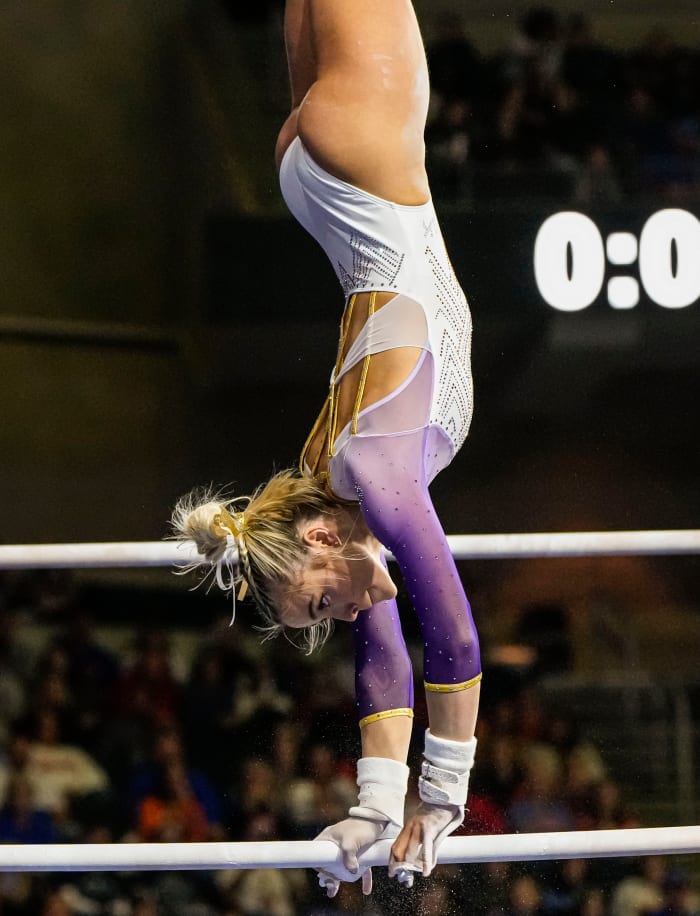
Dunne is currently the top NIL earner in the country among women athletes.
Dale Zanine/USA TODAY Sports
“People definitely discredit what I do,” Dunne says. “People need to understand that I’ve worked for everything I’ve earned. I’ve spent years building an audience, and brands pay me for what they believe is worth the reach of the demographic that I offer.” She hopes the financial security the Livvy Fund provides her peers will be part of her legacy. “Me being at the forefront, the most important thing for me was to give back,” she says.
Jacobs says, “There are things that this younger generation understands better because they live in that social media world. But then, obviously, there are things that, probably me at 18, if I was a famous Instagram influencer, I would also not understand some of the ramifications.”
LSU does, so it has built out a staff of five people dedicated entirely to NIL, thought to be one of the largest such groups in the NCAA. (Many nonathlete students also see the ramifications; 82 people applied for internships in the department this year.) Jacobs and her staff upload most of their programming to social media as videos and graphics, hoping to meet the kids where they are. They are planning to introduce an app soon. And in addition to teaching athletes how to network, how to dress professionally and how to pitch themselves to brands, LSU mandates financial literacy training for them at least once a semester.
(“We are all available for student-athletes to set up meetings, no matter what sport, male or female,” Jacobs says. “It’s probably no surprise to you that the female student-athletes tend to take a little bit more advantage of that.”)
At those sessions, they spend barely more time on NIL than they do on another acronym: IRS. Like many young adults, Reese is grappling with what happens after the check arrives. “They don’t teach you that you have to pay taxes!” she laments with a laugh. “The more money you make, the more you have to give away!”
The money is life-changing, but Dunne, Johnson and Reese say they also take pride in their rankings atop the list of earners.
“Just being able to see how much I’ve inspired people,” Reese says. “Not just people that look like me, but everybody in general. Like, men, women, young girls, young boys, older people—older people will text me to say, like, ‘Thank you for saying things that I don’t have the platform to [say].’”
She likes the idea that being who she is can be lucrative. And that’s the message she passes on to younger people who ask. Many of them are male athletes, including LSU football players. Brian Kelly has used her, alongside former Tigers national champion and current Cincinnati Bengals quarterback Joe Burrow, as a recruiting tool. She patrolled the sidelines at the spring game and she meets high schoolers on campus and talks to them over the phone. Sometimes the players just want photos with her, she says. Sometimes they are just fans who want to say hi. And sometimes they want to know how to become as popular as she is. She is pretty sure she’s signed a few, although she can’t be sure.
“I don’t know the football players,” she admits sheepishly. “I don’t know any of their names. Maybe if you sent me pictures, I could remember the pictures. But I don’t know their names.” That’s O.K. They know hers.



